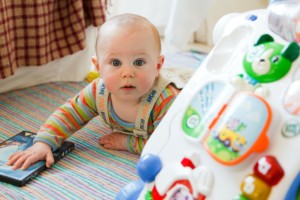Your toddler may not be talking up a storm, but how much of what you say, do they really understand? It may surprise you that your toddler both listens and understands a lot more than you think.
Expert Jean Berko Gleason, Ph.D., a professor of psychology at Boston University and author of The Development of Language explains in an article in Parent Magazine, “There is often a huge difference between receptive language and expressive language at this age. Toddlers can clearly understand complex conversation long before most parents think they can.”
 Babies as young as 4 months, start recognizing their name. So, when they hear their name in conversation, they may listen more intently.
Babies as young as 4 months, start recognizing their name. So, when they hear their name in conversation, they may listen more intently.
Social cues are mastered as early as 14 months. When we breathe a little slower, talk softly and gently we are happy and relaxed. Compared to rapid breathing, quicker movements, and loud voices when we aren’t so happy.
“If a parent complains about her child taking off his diaper but thinks it was cute, the baby will hear a voice with a nice lilt to it,” he says. “If she’s angry, he’ll pick up on that tone too,” Edward Schor, M.D., medical director at the Iowa Department of Public Health, in Des Moines, told Parent Magazine
By 12 months old, a child typically understands about 50 words. Usually, simple nouns like mama, dada, dog, referring to people or objects. Then in the months to come, they start understanding verbs, such as run, walk, and kiss.
Between 18 and 21 months, experts say toddlers learn about 9 new words every day, they call it a “language explosion”. This is when they really start to understand what you are saying in conversations with not only them but with others. For instance, if you’re complaining about the mess your toddler made while they eating, they pick up on that, and the negative way you are communicating.
Also, just the opposite is true, if you are talking about something cute they did, they pick up on the happy and loving voice.
Be careful not to label, as an Orlando mother, Celia Graham learned:
When Josh was a toddler, he went through a phase where he wouldn’t say hello or even respond when people asked him questions, so I explained it by saying, ‘He’s shy,’ ” she recalls. She didn’t think he understood, “but as he got older, he started to say the same thing about himself. I felt as if I had stigmatized him.”
 Dr. Seuss had it right in Horton Hears a Who! “A person’s a person, no matter how small.”
Dr. Seuss had it right in Horton Hears a Who! “A person’s a person, no matter how small.”
Babies and toddlers understand more than you realize. Instead of talking about them like they weren’t in the room, try and include your child in the conversation.
This strengthens their interactional and linguistic capacity. For instance, if you are telling your spouse about what you did at the park, ask your child to tell about their favorite part of the park.
If you have any concerns about your child’s ability to understand or speak, please reach out for a consultation. First Words Speech Therapy uses a holistic approach, unique to each child to ensure they are motivated and interested in the activities. A program designed especially to meet your child’s needs. This tailored technique makes sessions more engaging and meaningful.
We encourage you to contact First Words Speech Therapy with any questions or concerns.


